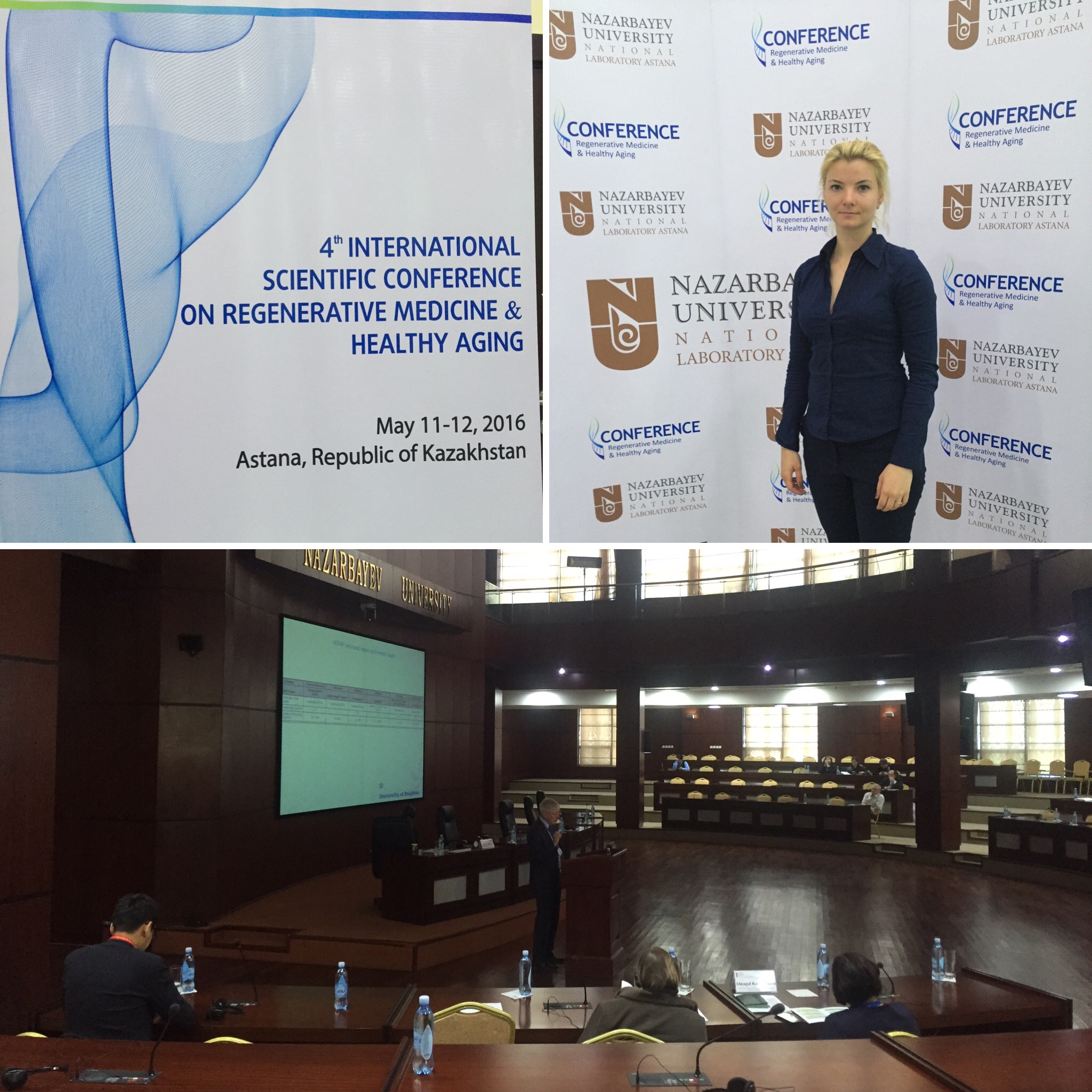May 17th, 2016
On May, 11-12th I worked as a simultaneous English-Russian interpreter in Astana, at the Nazarbayev University at the 4th International Scientific Conference on regenerative medicine and healthy aging.

English translator at Nazarbayev University
The conference was really multidisciplenary as it touched upon such issues as risk factors of the coronary heart disease, rodon-induced lung cancer, treatment of end-stage liver desease as well as targeted sequencing and carbon wound dressings. As it happens quite often at medical conferences, the speaker do not provide organizers with their presentations ahead of time due to intellectual property reasons, so interpreters cannot prepare for the conference which make the work so much more difficult. The topics were also very varied: they ranged frm cardiology to oncology, from gerontology to neurology which means as a translator you have to be prepared for everythign and anything.
Finally two challenging but interesting days are over and among other things that I learnt at the conference I now know there is an app for mobile phones that can track wrinkles on one’s face 🙂
Tags: English-Russian simultaneous translation, interpreter Nazarbayev University, medical translation astana
Posted in About Kazakhstan, Astana, Foreigners in Kazakhstan, Interpreter Astana, medical translation, News, Simultaneous translation, translation services, translation Астана
» No Comments
April 10th, 2015
On April, 9th 2015 I worked as a simultaneous Russian-English translator at the I Eurasian Congress of Gerontologists.
The Congress gathered scientists from Kazakhstan, Russia, Belarus, Ukraine, USA, Japan with the participation of the State Secretary of Kazakhstan and the Minister of healthcare and social protection of Kazakhstan.

Reports were delivered on topics like: “Molecular Aspects of Peptide Regulation of Ageing”, “Heart tissue engineering”, “Geriatric Frailty and Its Prevention as a Concept of Modern Gerontology”, “Treatment of Comorbidities Improves Overall Survival and Quality of Life of Brain Tumor Patients” and many others.
It was the first time that I had a chance to translate this area of medicine but its terminology is not that specific; it has a lot of terms from a general medicine, such as cardio-vascular deceases, diabetes, malignant tumor, mortality, healthy life style, etc.

I have learnt a lot of interesting things: for example, it is not a good idea to switch on bright light at night as it reduces the level of melatonin being produced in out bodies which protects us from ageing. Or that there is such thing as light pollution: our cities are never in complete darkness, they are highly illuminated which is again not good for our bodies that should be experiencing darkness at night and light during day time.
In other words, the Congress was very informative and fuitful, scientists have shared their achievements and new ideas with each other. Now thanks to my work I know a little bit more about how to live a long and healthy life and, as Ashley Montagu said, better die young as late as possible.
Tags: medical translation astana, medical translator astana, Russian-English simultaneous translator, simultaneous interpreter astana, Translator Astana
Posted in Astana, Foreigners in Kazakhstan, medical translation, News, Sessions, Simultaneous translation, translation services, Астана
Comments Off on Russian-English translation at the I Eurasian Congress of Gerontologists.
February 26th, 2012
For a week I worked at the National Cardiosurgery Center where Siemens conducted training for surgeons. I have already interpreted a similar training in Karaganda last year so I knew what to expect this time.

Training was dedicated to the special system and its applications that are used in such medical examinations as electrophysiology and hemodynamics. We started with the general information about the application, with the ways of registering a patient in the system database, with different ways of measuring pressure in heart chambers and vessels, so in the beginning my translation was more IT related. However, when we moved onto more specific questions such as catheter pullback sequence, translation became very specific in terms of medical vocabulary – atrium, ventricle, shunt, mitral valve, superior vena cava, end diastolic pressure, etc.
The training was “hands-on”, i.e. hands on the patient, doctors were performing their usual daily procedures while learning about the possibilities of the programme. Over this week I have seen about 15 operations and now feel like a cardiosurgeon myself 🙂 I have definitely learnt a lot about heart and the way it functions. I should say I am really impressed by the work that the doctors do every day. Many of them are very young and yet so professional, you could trust them with your life and heart without any doubts!
Tags: English translator in Astana, medical translation astana, siemens kazakhstan, training in astana
Posted in Astana, Foreigners in Kazakhstan, Siemens, translation services
Comments Off on Siemens training at the National Cardio Surgery Center
